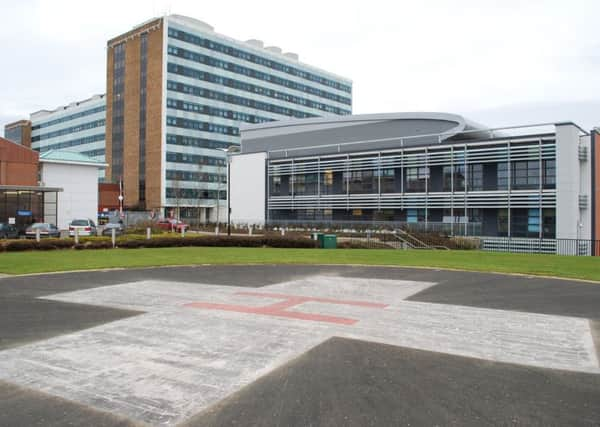Number of Altnagelvin A&E patients waiting over 12 hours soars


The breaches of the 12 hours target for patients to be discharged, or admitted to hospital, show a shocking rise of over 500 per cent from 24 patients in March 2017 to 141 during March this year.
The figures contained within a new ‘Emergency Care Waiting Times Statistics’ report published by the Health & Social Care Board show that attendances at A&E here rose from 5,491 in March 2017 to 5,798 in March 2018.
Advertisement
Hide AdAdvertisement
Hide AdThe Western Trust last night apologised to those affected and said rising numbers of patients and lack of bed capacity, had contributed towards the current issues.


As well as the 12 hours breaches, the Derry hospital’s target for people to be treated or discharged within four hours, has also slipped from 69.8 per cent in March 2017 to 65.9 per cent in March 2018.
Altnagelvin’s ED, however was the quickest in the North in terms of the wait between people being triaged and then starting treatment, with 95 per cent beginning treatment within around three hours.
Speaking about the rise in the numbers of people waiting longer at the Accident & Emergency Department, a spokesperson for the Western Trust said:“Like other Emergency Departments regionally and nationally, the number of attendances to our EDs are increasing year on year.
Advertisement
Hide AdAdvertisement
Hide Ad“The reasons for this are multifactorial, including the growing and ageing population with increasingly complex healthcare needs.
“There is a lack of capacity in in-patients’ beds, this has meant patients have had to wait longer than we would of liked in our Emergency Department before being admitted to the hospital.”
She added: “We apologise to patients who have experienced a long wait in Emergency Department.
“We would like to thank our staff who are working hard and prioritising the needs of their patients during these challenging times.”
The Trust confirmed staffing pressures was also an issue.
Advertisement
Hide AdAdvertisement
Hide Ad“There is a shortage of Band 5 nurses within the hospital. We are exploring all options available to resolve our nursing staff issue.
“In the immediate term we are sourcing staff from bank lists and nursing agencies.
“The Western Trust also has an ongoing enhanced recruitment campaign every few weeks to attract registered nurses to our hospitals. The Trust is also preparing for a Nursing Information Day, that will be held in June 2018.
“Additionally we are participating in the regional international nurse recruitment campaign. The nursing staffing challenges is not unique to the Western Trust, there is a global shortage of registered nurses.”
Advertisement
Hide AdAdvertisement
Hide AdMeanwhile, a new Royal College of Emergency Medicine report, which surveyed over 70 per cent of ED consultants in the north, revealed that the vast majority ‘strongly agreed’ that patients are at an increased risk of poorer outcomes due to crowding, whilst almost all agreed that there was an insufficient medical and nursing staff to cope with current demand in EDs.
The new survey of consultants at A&Es in Northern Ireland has revealed that 98 per cent believe Emergency Medicine is in a state of crisis here.
Sinn Fein Councillor Patricia Logue has called for immediate action to support staff. “This is unacceptable,” she said.
Colr. Logue, Sinn Féin spokesperson for Health, said: “Workforce shortages continue to be a fundamental problem facing the health system.
Advertisement
Hide AdAdvertisement
Hide Ad“Despite the commitment and dedication of HSC staff who continue to deliver a high standard of care in very challenging circumstances its clear workforce shortages are having an impact.
“The stress and frustration being experienced by HSC staff is also negatively affecting their well-being and morale. The department needs to step up staff recruitment and retention efforts in the short-term and publish the long-awaited workforce strategy that will plan for a sustainable HSC workforce going forward.”